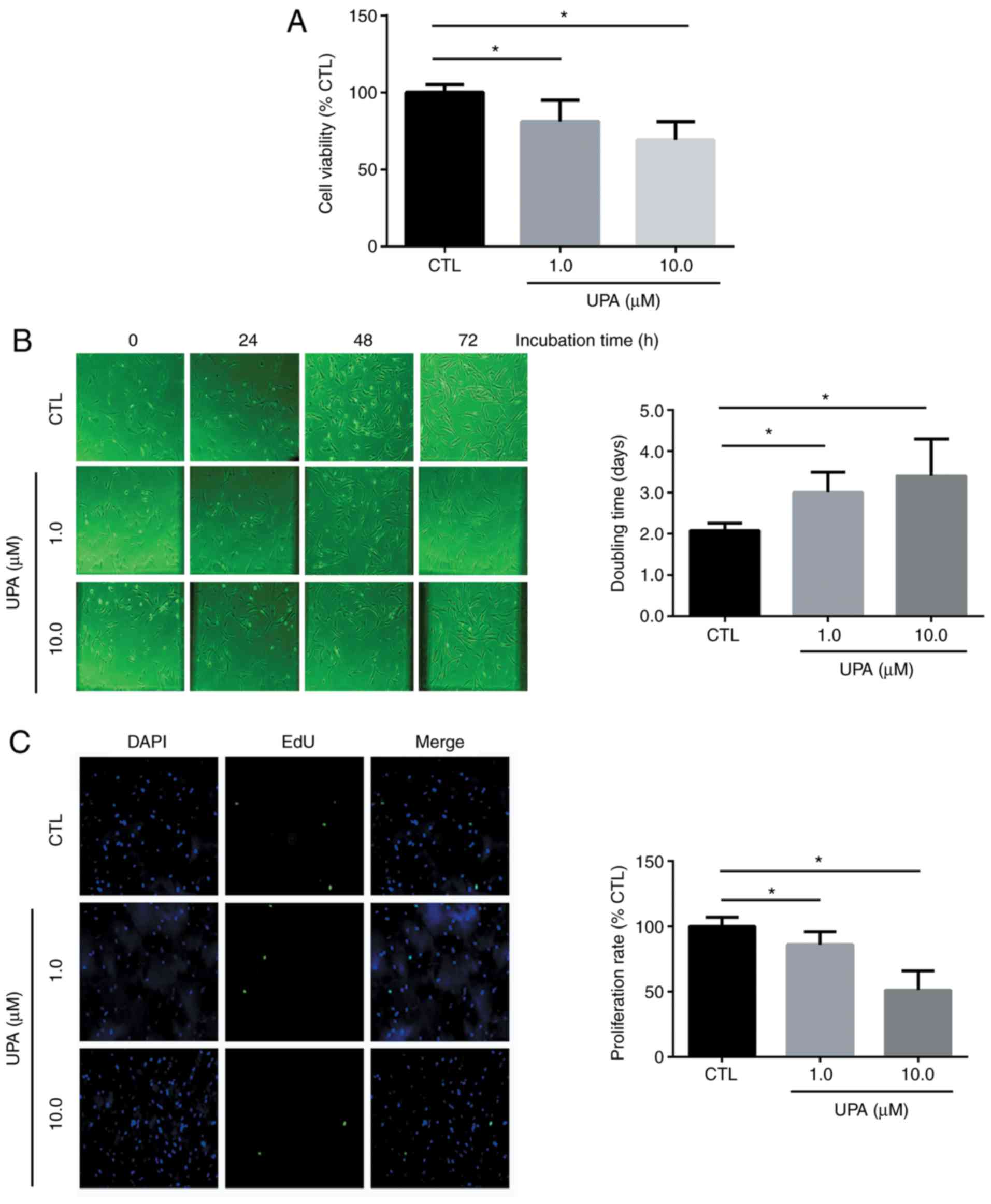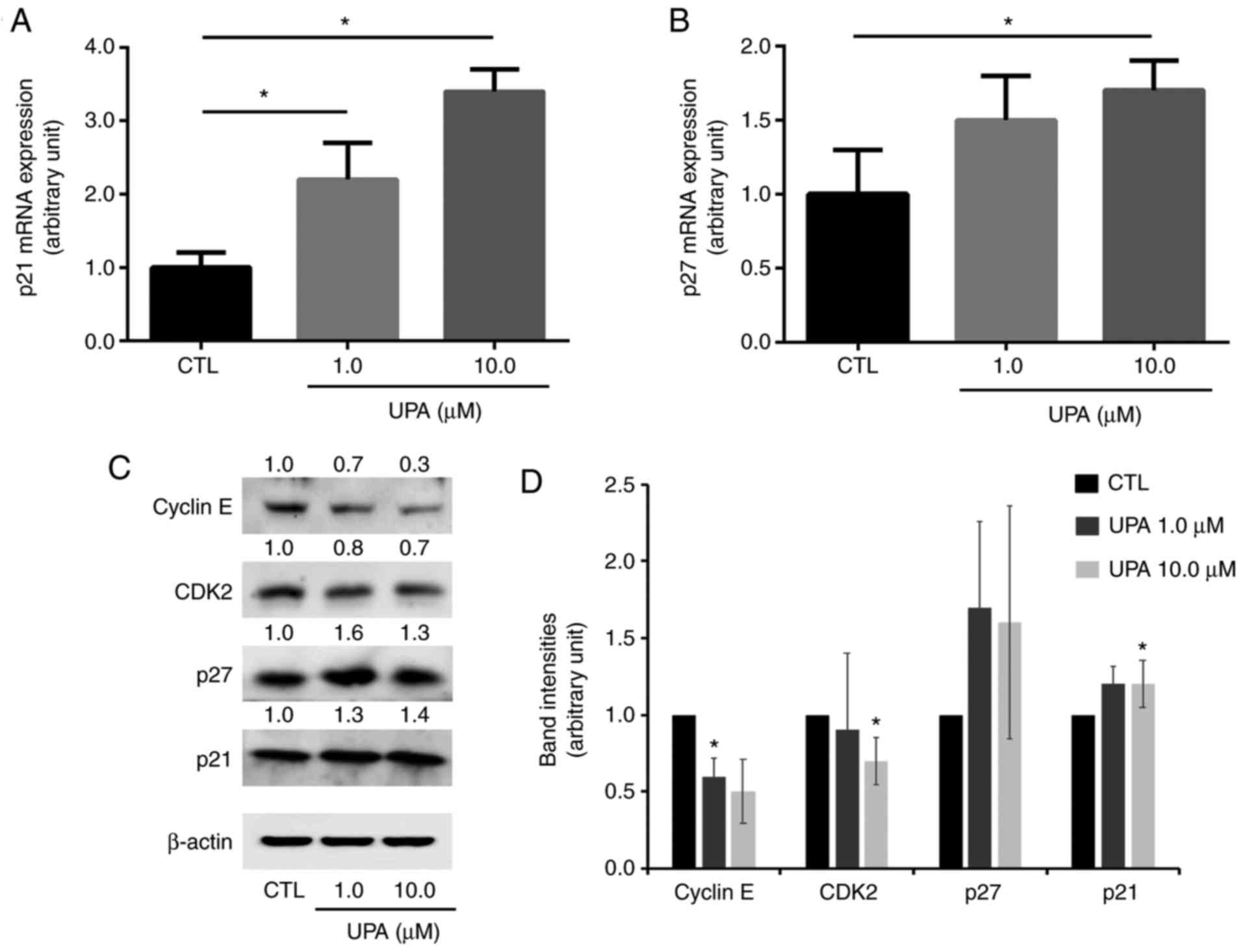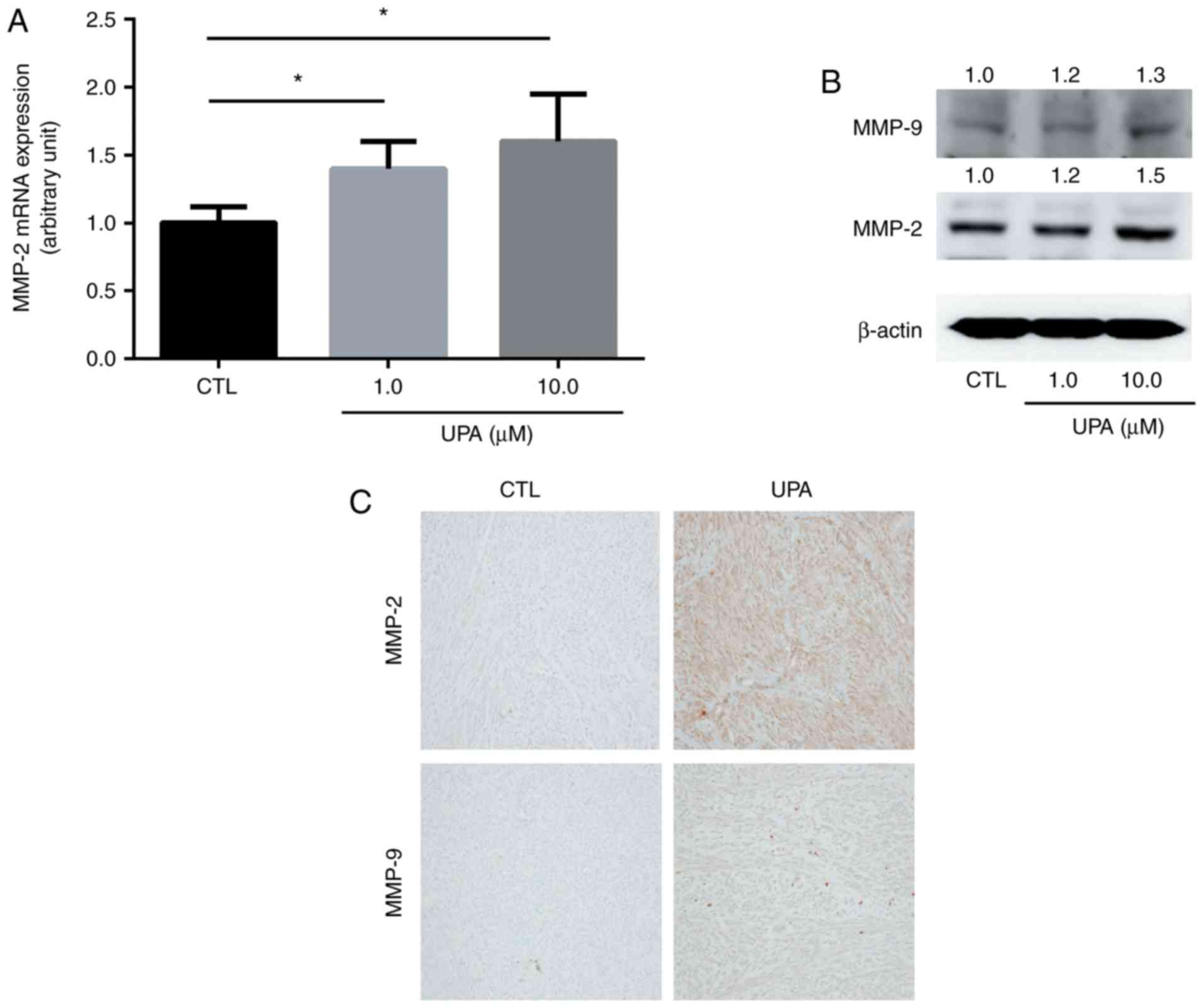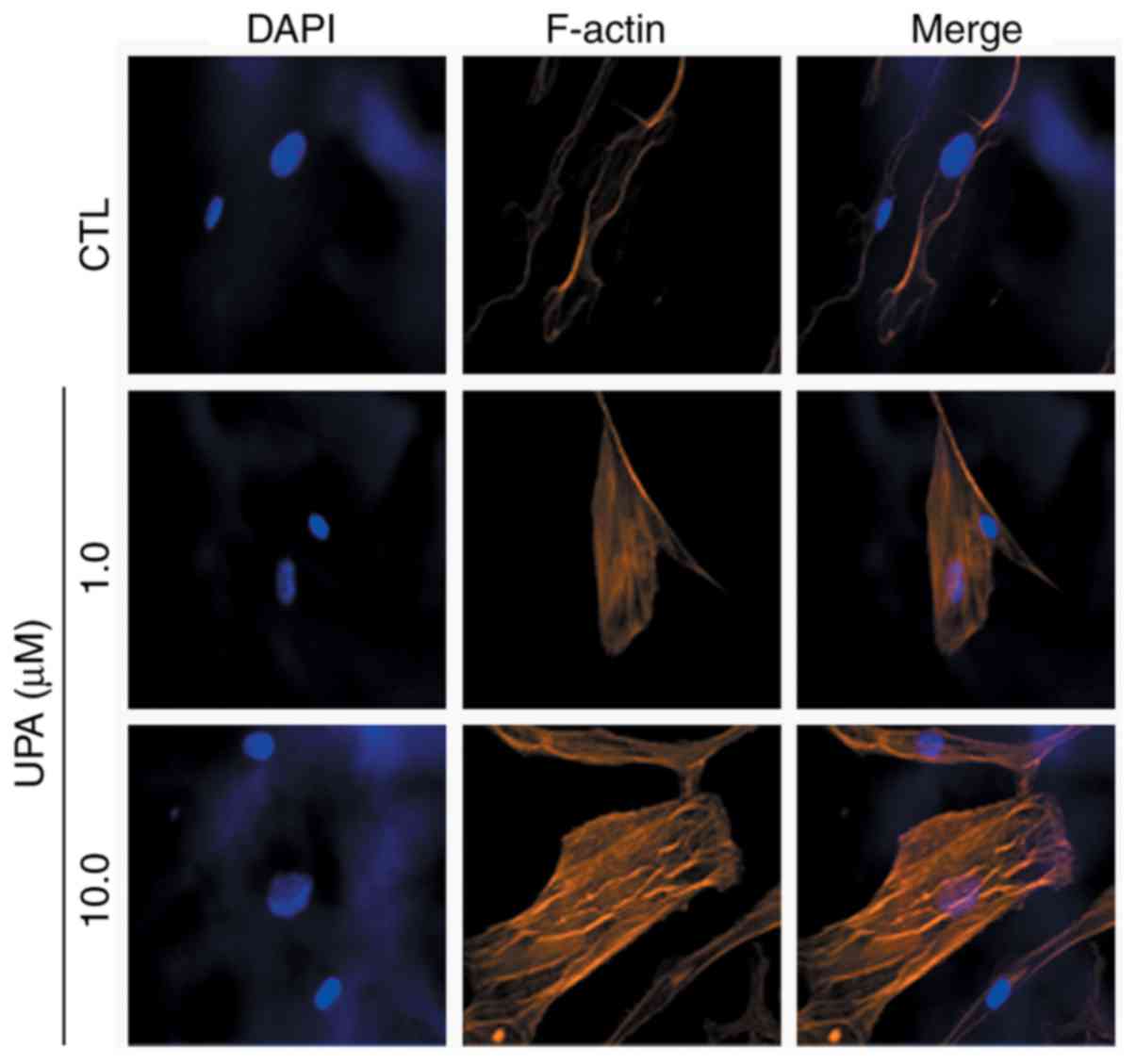|
1
|
Malik M, Norian J, McCarthy-Keith D,
Britten J and Catherino WH: Why leiomyomas are called fibroids: The
central role of extracellular matrix in symptomatic women. Semin
Reprod Med. 28:169–179. 2010. View Article : Google Scholar : PubMed/NCBI
|
|
2
|
Leppert PC, Baginski T, Prupas C,
Catherino WH, Pletcher S and Segars JH: Comparative ultrastructure
of collagen fibrils in uterine leiomyomas and normal myometrium.
Fertil Steril. 82(Suppl 3): 1182–1187. 2004. View Article : Google Scholar : PubMed/NCBI
|
|
3
|
Stewart EA: Uterine fibroids. Lancet.
357:293–298. 2001. View Article : Google Scholar : PubMed/NCBI
|
|
4
|
Buttram VC Jr and Reiter RC: Uterine
leiomyomata: Etiology, symptomatology, and management. Fertil
Steril. 36:433–445. 1981. View Article : Google Scholar : PubMed/NCBI
|
|
5
|
Flake GP, Andersen J and Dixon D: Etiology
and pathogenesis of uterine leiomyomas: A review. Environ Health
Perspect. 111:1037–1054. 2003. View
Article : Google Scholar : PubMed/NCBI
|
|
6
|
Zimmermann A, Bernuit D, Gerlinger C,
Schaefers M and Geppert K: Prevalence, symptoms and management of
uterine fibroids: An international internet-based survey of 21,746
women. BMC Womens Health. 12:62012. View Article : Google Scholar : PubMed/NCBI
|
|
7
|
Flynn M, Jamison M, Datta S and Myers E:
Health care resource use for uterine fibroid tumors in the United
States. Am J Obstet Gynecol. 195:955–964. 2006. View Article : Google Scholar : PubMed/NCBI
|
|
8
|
Kashani BN, Centini G, Morelli SS, Weiss G
and Petraglia F: Role of medical management for uterine leiomyomas.
Best Pract Res Clin Obstet Gynaecol. 34:85–103. 2016. View Article : Google Scholar : PubMed/NCBI
|
|
9
|
Bendifallah S, Brun JL and Fernandez H:
Myomectomy for infertile women: The role of surgery. J Gynecol
Obstet Biol Reprod (Paris). 40:885–901. 2011.In French. View Article : Google Scholar
|
|
10
|
Yun BS, Seong SJ, Cha DH, Kim JY, Kim ML,
Shim JY and Park JE: Changes in proliferating and apoptotic markers
of leiomyoma following treatment with a selective progesterone
receptor modulator or gonadotropin-releasing hormone agonist. Eur J
Obstet Gynecol Reprod Biol. 191:62–67. 2015. View Article : Google Scholar : PubMed/NCBI
|
|
11
|
Horak P, Mara M, Dundr P, Kubinova K,
Kuzel D, Hudecek R and Chmel R: Effect of a selective progesterone
receptor modulator on induction of apoptosis in uterine fibroids in
vivo. Int J Endocrinol. 2012:4361742012. View Article : Google Scholar : PubMed/NCBI
|
|
12
|
Maruo T, Ohara N, Matsuo H, Xu Q, Chen W,
Sitruk-Ware R and Johansson ED: Effects of levonorgestrel-releasing
IUS and progesterone receptor modulator PRM CDB-2914 on uterine
leiomyomas. Contraception. 75(Suppl 6): S99–S103. 2007. View Article : Google Scholar : PubMed/NCBI
|
|
13
|
Morikawa A, Ohara N, Xu Q, Nakabayashi K,
DeManno DA, Chwalisz K, Yoshida S and Maruo T: Selective
progesterone receptor modulator asoprisnil down-regulates collagen
synthesis in cultured human uterine leiomyoma cells through
up-regulating extracellular matrix metalloproteinase inducer. Hum
Reprod. 23:944–951. 2008. View Article : Google Scholar : PubMed/NCBI
|
|
14
|
Cawston TE and Young DA: Proteinases
involved in matrix turnover during cartilage and bone breakdown.
Cell Tissue Res. 339:221–235. 2010. View Article : Google Scholar
|
|
15
|
Islam MS, Protic O, Giannubilo SR, Toti P,
Tranquilli AL, Petraglia F, Castellucci M and Ciarmela P: Uterine
leiomyoma: Available medical treatments and new possible
therapeutic options. J Clin Endocrinol Metab. 98:921–934. 2013.
View Article : Google Scholar : PubMed/NCBI
|
|
16
|
Vandesompele J, De Preter K, Pattyn F,
Poppe B, Van Roy N, De Paepe A and Speleman F: Accurate
normalisation of real-time quantitative RT-PCR data by geometric
averaging of multiple internal control genes. Genome Biol.
3:RESEARCH0034. 2002. View Article : Google Scholar
|
|
17
|
Koohestani F, Braundmeier AG, Mahdian A,
Seo J, Bi J and Nowak RA: Extracellular matrix collagen alters cell
proliferation and cell cycle progression of human uterine leiomyoma
smooth muscle cells. PloS One. 8:e758442013. View Article : Google Scholar : PubMed/NCBI
|
|
18
|
Donnez J, Vazquez F, Tomaszewski J, Nouri
K, Bouchard P, Fauser BC, Barlow DH, Palacios S, Donnez O, Bestel
E, et al: Long-term treatment of uterine fibroids with ulipristal
acetate. Fertil Steril. 101:1565–1573. e1561–1518. 2014. View Article : Google Scholar
|
|
19
|
Ramachandran S, Kwon KY, Shin SJ, Kwon SH,
Cha SD, Bae I and Cho CH: Cyclin-dependent kinase inhibitor
p27Kip1 controls growth and cell cycle progression in
human uterine leiomyoma. J Korean Med Sci. 23:667–673. 2008.
View Article : Google Scholar : PubMed/NCBI
|
|
20
|
Koff A, Giordano A, Desai D, Yamashita K,
Harper JW, Elledge S, Nishimoto T, Morgan DO, Franza BR and Roberts
JM: Formation and activation of a cyclin E-cdk2 complex during the
G1 phase of the human cell cycle. Science. 257:1689–1694. 1992.
View Article : Google Scholar : PubMed/NCBI
|
|
21
|
Slingerland J and Pagano M: Regulation of
the cdk inhibitor p27 and its deregulation in cancer. J Cell
Physiol. 183:10–17. 2000. View Article : Google Scholar : PubMed/NCBI
|
|
22
|
Shime H, Kariya M, Orii A, Momma C,
Kanamori T, Fukuhara K, Kusakari T, Tsuruta Y, Takakura K, Nikaido
T and Fujii S: Tranilast inhibits the proliferation of uterine
leiomyoma cells in vitro through G1 arrest associated with the
induction of p21(waf1) and p53. J Clin Endocrinol Metab.
87:5610–5617. 2002. View Article : Google Scholar : PubMed/NCBI
|
|
23
|
Flake GP, Moore AB, Flagler N, Wicker B,
Clayton N, Kissling GE, Robboy SJ and Dixon D: The natural history
of uterine leiomyomas: Morphometric concordance with concepts of
interstitial ischemia and inanosis. Obstet Gynecol Int.
2013:2851032013.PubMed/NCBI
|
|
24
|
Palmer SS, Haynes-Johnson D, Diehl T and
Nowak RA: Increased expression of stromelysin 3 mRNA in leiomyomas
(uterine fibroids) compared with myometrium. J Soc Gynecol
Investig. 5:203–209. 1998. View Article : Google Scholar : PubMed/NCBI
|
|
25
|
Dimitrova IK, Richer JK, Rudolph MC,
Spoelstra NS, Reno EM, Medina TM and Bradford AP: Gene expression
profiling of multiple leiomyomata uteri and matched normal tissue
from a single patient. Fertil Steril. 91:2650–2663. 2009.
View Article : Google Scholar :
|
|
26
|
Wolańska M, Sobolewski K, Bańkowski E and
Jaworski S: Matrix metalloproteinases of human leiomyoma in various
stages of tumor growth. Gynecol Obstet Invest. 58:14–18. 2004.
View Article : Google Scholar
|
|
27
|
Pollard TD and Cooper JA: Actin and
actin-binding proteins. A critical evaluation of mechanisms and
functions. Annu Rev Biochem. 55:987–1035. 1986. View Article : Google Scholar : PubMed/NCBI
|
|
28
|
Tojkander S, Gateva G and Lappalainen P:
Actin stress fibers-assembly, dynamics and biological roles. J Cell
Sci. 125:1855–1864. 2012. View Article : Google Scholar : PubMed/NCBI
|
|
29
|
Desouza M, Gunning PW and Stehn JR: The
actin cytoskeleton as a sensor and mediator of apoptosis.
Bioarchitecture. 2:75–87. 2012. View Article : Google Scholar : PubMed/NCBI
|
|
30
|
Franklin-Tong VE and Gourlay CW: A role
for actin in regulating apoptosis/programmed cell death: Evidence
spanning yeast, plants and animals. Biochem J. 413:389–404. 2008.
View Article : Google Scholar : PubMed/NCBI
|
|
31
|
Hall AK: Thymosin beta-10 accelerates
apoptosis. Cell Mol Biol Res. 41:167–180. 1995.PubMed/NCBI
|
|
32
|
Petrache I, Verin AD, Crow MT, Birukova A,
Liu F and Garcia JG: Differential effect of MLC kinase in
TNF-alpha-induced endothelial cell apoptosis and barrier
dysfunction. Am J Physiol Lung Cell Mol Physiol. 280:L1168–L1178.
2001. View Article : Google Scholar : PubMed/NCBI
|
|
33
|
Blithe DL, Nieman LK, Blye RP, Stratton P
and Passaro M: Development of the selective progesterone receptor
modulator CDB-2914 for clinical indications. Steroids.
68:1013–1017. 2003. View Article : Google Scholar : PubMed/NCBI
|
|
34
|
Busfield RA, Farquhar CM, Sowter MC,
Lethaby A, Sprecher M, Yu Y, Sadler LC, Brown P and Johnson N: A
randomised trial comparing the levonorgestrel intrauterine system
and thermal balloon ablation for heavy menstrual bleeding. BJOG.
113:257–263. 2006. View Article : Google Scholar : PubMed/NCBI
|
|
35
|
Donnez J, Donnez O, Matule D, Ahrendt HJ,
Hudecek R, Zatik J, Kasilovskiene Z, Dumitrascu MC, Fernandez H,
Barlow DH, et al: Long-term medical management of uterine fibroids
with ulipristal acetate. Fertil Steril. 105:165–173. e1642016.
View Article : Google Scholar
|
|
36
|
Donnez J, Tomaszewski J, Vázquez F,
Bouchard P, Lemieszczuk B, Baró F, Nouri K, Selvaggi L, Sodowski K,
Bestel E, et al: Ulipristal acetate versus leuprolide acetate for
uterine fibroids. N Engl J Med. 366:421–432. 2012. View Article : Google Scholar : PubMed/NCBI
|


















